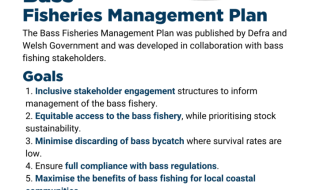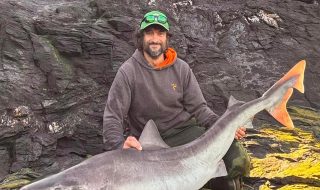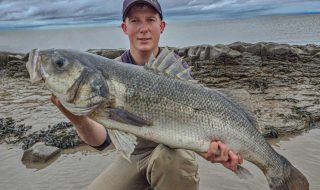Trawling for bass during the spawning period has been banned in a historic set of emergency measures aimed at averting a total collapse of Europe’s bass stocks.
The ban on pelagic trawling – which accounts for 25 per cent of the impact on the stock and includes the controversial method of pair trawling – will begin immediately in the Channel, Celtic sea, Irish Sea and Southern North Sea and run until April 30th during which time adult bass aggregate to reproduce and are most vulnerable.
The EU is putting forward further measures to deal with the impact on bass stocks of recreational and other commercial fishing methods. For recreational bass angling the proposals include a three fish a day bag limit and an increase in the legal minimum size of bass from 36cm to 42cm.
The European Commission is also proposing limiting catches for other commercial bass fisheries and is working on a proposal with member states which will be taken to the Council of fisheries ministers as soon as possible.
The emergency measures have been introduced following scientific advice in June 2014 that recommended an 80 per cent cut in catches from the previous year and confirmation that continued fishing pressure was leading to serious harm to the reproductive capacity of the stock.
This is the first time that Article 12 of the reformed Common Fisheries Policy has been invoked due to, “A serious threat to the conservation of marine biological resources..”.
The Angling Trust and our partners at the Bass Anglers Sportfishing Society (B.A.S.S.) and (European Anglers Alliance) have been campaigning tirelessly for the introduction of conservation measures for bass – a crucially important recreational species and one that generates hundreds of millions of pounds and supports tens of thousands of jobs across Europe. In 2012 the Angling Trust organised a delegation to the then Fisheries Minister Richard Benyon to press the case for bass conservation measures in the face of evidence demonstrating that stocks were in trouble.
The Angling Trust will be continuing to work with the UK and the Commission to ensure that the measures to limit other commercial bass fisheries are in proportion to the new bag limit and minimum size being proposed for recreational catches. In addition the Trust will be working with the UK to agree on what additional measures the UK can take to restore the UK bass fishery.
David Mitchell, the Angling Trust’s Marine Campaigns Manager, said;
“Emergency measures such as this, can last for a maximum of 12 months so it is crucial that the Commission and member states now follow through on the commitment to develop a long term bass management plan which the Angling Trust and our partners will play a key role in helping to develop. This is an historic decision for recreational fishing and hopefully represents a sea change in public policy towards marine conservation. However, there’s a long way to go yet to achieve what is needed for a truly sustainable fishery.”
Mark Lloyd, Chief Executive of the Angling Trust, said;
“Bass anglers have been calling for action to protect stocks for nearly a decade and it seems that the UK government and European Commission have at last acted, in the face of undeniable scientific evidence and a concerted campaign by the Angling Trust and BASS. The immediate emergency measures that have been confirmed are very welcome and the intention to follow these up with further restrictions on commercial exploitation is encouraging. “
Nigel Horsman, of the Bass Anglers Sportfishing Society, said;
“This is a great day for Dicentrarchus Labrax, the fabulous European Sea Bass, and what we have been working so hard and waiting so long for. We also look forward to the production of a long term management plan for bass, which will lead to healthy stocks of all sizes of bass for the benefit of everyone who uses this stock sustainably.
I would like to pay tribute to the fantastic work of everyone in the Bass Anglers Sportfishing Society (BASS) and the Angling Trust who campaigned for this for many years. The strength and breadth of that support has been invaluable in achieving this amazing result.
We know that recruitment to the adult stock will be weak for the next few years, but I hope these measures will ensure that the current stock remains broadly stable until environmental conditions allow a full stock recovery, which we can cherish and then enjoy great British Bass fishing for many years to come.”






